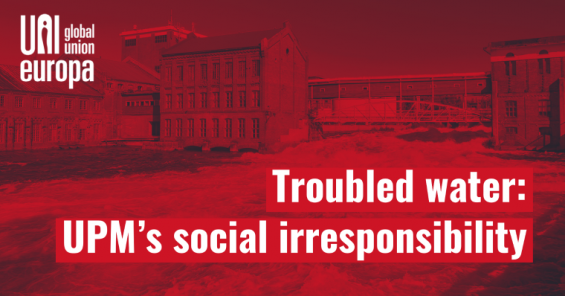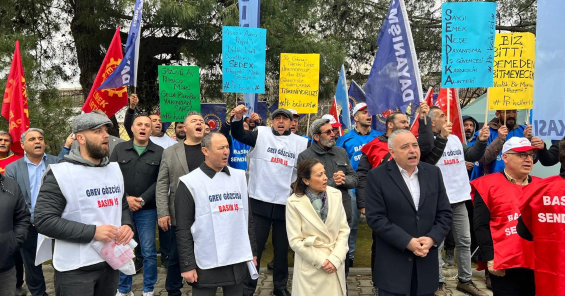Are social commitments of voluntary certification schemes such as FSC truly effective? The case of UPM suggests not.

UPM Group, a major multinational company in the forestry-based industry headquartered in Finland, is leading an attack on the collective bargaining system in its host country. That this approach is compatible with the company’s FSC-certification calls into question the effectiveness of voluntary corporate social responsibility schemes such as this. UNI Europa underlines the need for the EU to further its commitment to social dialogue through instruments such as the due diligence directive or the linking of public procurement to collective bargaining for a genuine just transition.
In May 2021 UNI Europa drew attention to the struggle of workers in Finland to prevent UPM Group from withdrawing collective bargaining with white-collar workers, following an initial assault on the collective bargaining system by the Finnish forest industry employers’ organisation. The situation has not improved since then, forcing the Finnish union Pro to call a three-week strike starting on 1 January 2022, which UPM attempted to derail by paying scab labour an extra €30/day for the duration of the strike.
It is worth noting that, during 2021, the voluntary certification system of the Forest Stewardship Council (FSC), added eight ILO Conventions in its core labour requirements for the chain of custody certification standard, including the upholding freedom of association, and the effective recognition of the right to collective bargaining.
UPM is not the only FSC-certified company to undermine social standards. In 2021 alone, UNI and IndustriALL global unions responded to two complaints from Colombian workers in two FSC-certified multinational companies (Essity and Smurfit Kappa) for violations of these rights. The UPM case, though not comparable to the seriousness of the situation in Colombia, where 3,240 trade unionists have been murdered for seeking a better future for their people, is the first we have heard of in Europe involving an FSC-certified company trying to undermine social dialogue with practices that we are trying to eradicate in other parts of the world, such as disregarding collective bargaining or breaking up fair strikes.
UPM has also been recognised in 2021 as a Global Compact LEAD by the United Nations Global Compact, “the world’s largest corporate sustainability initiative”, due to their participation in the Action Platform “Decent Work in Global Supply Chains”. It is paradoxical that a company that prides itself on its contribution to decent work while undermining social standards that have delivered high living standards and social cohesion in its home country for more than 40 years. In this context, it is understandable that Finnish workers are questioning the relevance of these certificates given the attacks they are facing.
This only confirms what the European Parliament argued in its legislative own initiative resolution recommending to the Commission to initiate a legislative proposal on corporate due diligence and accountability of March 10, 2020; considering that voluntary due diligence standards have not achieved significant progress in preventing human rights and environmental harm and in enabling access to justice. If we all agree that human rights (and we must not forget that the right of association and collective bargaining are human rights) are inalienable and an indispensable condition for the development of economic activity in societies that aspire to be fair, the way forward is binding legislation and not to leave to industries, which may or may not have undermined these rights in the past, the responsibility to monitor their effective implementation based on voluntary adherence.
It is regrettable that the European Commission has failed on their commitment to adopt mandatory Due Diligence legislation in 2021. And we still don’t have a release date for this important piece of legislation.
UPM might not be disrespecting ILO convention 154. They are not firing or threatening workers representatives (as some companies do in Colombia and other countries) in order to avoid collective bargaining. What we want to point out here is that when you buy a product with the FSC label you might be buying from a responsible producer, investing to improve forest sustainability and social development, or from a company that is attacking collective bargaining principles around which Finnish society has been built for 40 years. The FSC tree-like stamp in the packaging doesn’t provide customers with any reliable information to distinguish among them.
UPM might not be disrespecting the right to collective bargaining, but they are disregarding collective bargaining. Disregarding the way Europe and in particular Finnish society has been built, based on agreements pursuing social cohesion, which are at the very foundations of Europe. But a Due Diligence directive, as good as it can be, won’t bring any solution for this alone.
Reinforcing collective bargaining
There is a responsibility of Member States to reinforce social dialogue and collective bargaining and not let it down. How can it be that €2 trillion is spent every year by governments and public institutions across the EU for goods and services delivered by private corporations, without any commitment to collective bargaining to get a return to society in the shape of better working conditions and wages with purchasing power to boost domestic consumption and thus territorial cohesion? How can this money go to companies attacking historical collective bargaining agreements such as UPM, without any policy makers making a connection between public spending and the capacity to promote socially responsible business? Public procurement should serve to support social cohesion rather than profit companies that fall short in their compromises with the societies they’re part of.
Fortunately, over than 100 Members of the European Parliament are backing UNI Europa’s campaign to only allow public contracts to go to companies that have collective agreements with their workers. If only the UPM workers, who are now in their third week of strike action, had such a powerful argument to convince the group’s management to sit down and negotiate working conditions collectively, and not condemn highly-skilled white-collar workers to an individual dispute over their wages and working conditions.
UPM still has the opportunity to rectify and abide by the deeply rooted principles of collective bargaining that are intrinsic to Finnish society. UPM can still behave in a socially responsible way, also in Europe, and meet the fair demand of the trade union Pro and the white-collar workers at UPM. We at UNI Europa firmly call them to do it. Failing that, they will provide further evidence that voluntary certification systems are insufficient to ensure socially responsible and respectful behaviour by companies towards the communities in which they operate.
You may also be interested in

Rana Plaza anniversary: MEPs must support due diligence today!
24.04.24
Press Release

Türkiye: UNI and IUF in solidarity with striking PilenPak workers
22.04.24
Statements
Meetings & Events
2024
14
May
PHSDialogue Project: 1st PHS Social Dialogue Plenary Session in Brussels 14 May
14 May 2024, 9h-16h CET | UNI Europa & EFSI Offices in Brussels
- Joint UNI & EFFAT Preparatory Meeting (morning, UNI Europa office)
- 1st PHS Social Dialogue Plenary Session (afternoon, EFSI office)
UNI Care Europa affiliates can register using the registration form below.
22
May